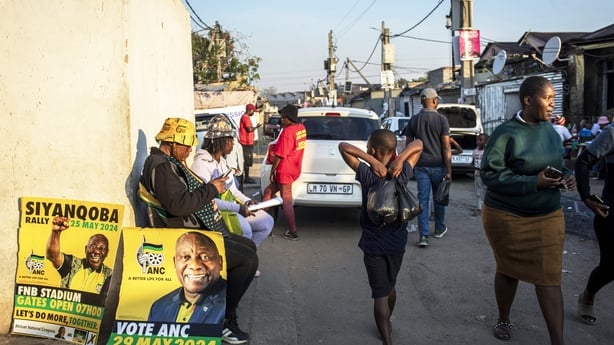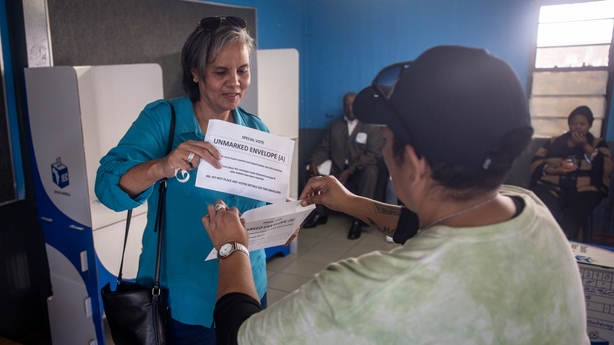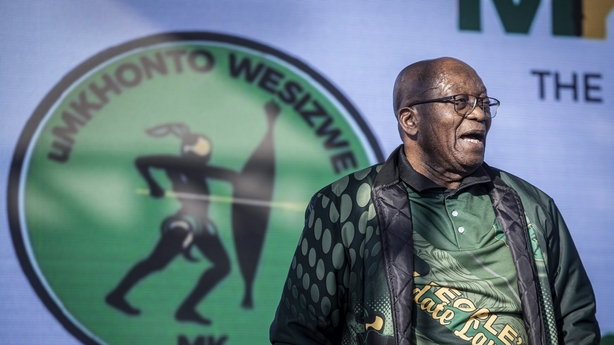"A rainbow nation at peace with itself and the world."
That was how South African President Nelson Mandela described his country in May 1994 in his inaugural address.
Everything about that occasion was historic. The general election which had precipitated Mr Mandela's presidency was the first to take place with full voting rights for all South Africans, following the end of the apartheid era.
Just four years prior, Mr Mandela walked out of Victor Verster prison having served almost four decades in jail after his conviction in 1964 for sabotage and conspiracy to violently overthrow the South African government.
He was viewed as the father of a new South Africa, conferring "glory and hope to newborn liberty" as he said in that first presidential speech, and leading his African National Congress Party, or ANC, into power after decades in which it had been banned.
A new generation of South Africans are going to the polls today, in the first national election in which most people in South Africa - which has a median age of about 28 - have no memory of decades of apartheid, the fight for freedom or the rise to power of the ANC.
In 1994, the first election the ANC could legally contest, it surged to victory with almost 63% of the vote and has dominated South African politics ever since.
As recently as 2019, the ANC garnered 57.5% of the popular vote, but polls indicate that this time could be very different.
Some polling suggests that this time the ANC party vote could fall as low as 40%, though with many voters saying they are undecided, that might be worst case scenario.

Nicole Beardsworth, politics researcher at the University of the Witwatersrand, told the Reuters news agency that she sees the ANC getting "a bit of a bump" at the elections.
"I don't think we're going to see the ANC get over 50%," she said.
"They're ... going to have negotiate a coalition. The big question is: with whom?"
The other question of course is: why? How has a party that dominated South African politics for three decades found itself polling so badly ahead of this vote?
When it came to power in 1994 the ANC did so on a promise of reversing the years of inequality which had kept a large portion of South Africa’s population locked out of education, economic mobility and access to basic services like decent housing with electricity and running water.

A report from the World Bank in April of this year said South Africa had "taken considerable strides to improve the well-being of its citizens since its transition to democracy in the mid-1990's, but progress has stagnated in the last decade".
That stagnation can be seen in figures which show that the percentage of the population living below the upper-middle-income country poverty line is projected to have gone from 57% in 2015 to 62.7% in 2023.
Unemployment is running at 32.1% in the last quarter of last year, though that rate jumps to 59.4% in the 15 - 24 age bracket, leaving many young South Africans jobless, disillusioned and frustrated at the lack of improvement in their lot.
That disenfranchisement among voters can be summed up by the World Bank description of South Africa as "a dual economy with one of the highest and most persistent inequality rates in the world".
Electricity supply shortages for example remain a major issue, affecting economic growth and daily life. Rolling scheduled power cuts which last between two to four hours at a time began in 2007.
Not only have they continued since then, but they have intensified in recent years, with the accumulated number of outages up from 48 days in 2021, to 289 days in 2023.
It is not hard to see why 31-year-old Zinhle Nyakenye told Reuters: "I don't see what I'm voting for. We don't have roads (or decent) houses."
Fetching water for her house from a stream in Nelson Mandela’s home town of Qunu, her experience, and political apathy, is replicated across the country.

Added to the economic malaise felt by so many are the high-profile corruption scandals involving politicians like Jacob Zuma, the former ANC leader and former South African President.
Mr Zuma, currently banned from standing for parliament and due to face another trial next year, will lead a new party into this election. uMkhonto we Sizwe or MK, takes its name from the former armed wing of the ANC and is currently polling between 8 and 14% nationally.
The latest Corruption Perceptions Index shows that South Africa had a score of 41 in 2023, down two points from the previous year, showing corruption as a significant problem.
Recent comments from current president Cyril Ramaphosa suggesting incidents of corruption had decreased during his time in office, were strongly refuted by the group Corruption Watch, a South African member of Transparency International.
Karam Singh, the Executive Director of Corruption Watch was keen to point out that "the levels of corruption have been on an upward trajectory for over a decade....and that despite the numerous organisations and institutions now doing their best to tackle the problem, the battle has not been won".
It is just one of many battles ahead for South Africa, and for whatever party or amalgamation of parties makes up the next government.




